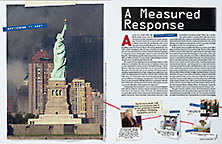For some NYU Law students, the post-9/11 interest in national security has aligned perfectly with their passions. Take Daniel Freifeld ’08. A seasoned globetrotter who speaks Turkish, French, and conversational Arabic, Farsi, and Spanish, Freifeld had worked at the World Bank and Defense Department before he matriculated, already aware of the Center on Law and Security. He got involved with the center as a 1L, rising to his current position as its director of international programs. “I can’t think of an organization that’s been more effective in shaping the counterterrorism debate,” Freifeld said. “A lot of changes in the broader policy community would not have been possible but for the introductions we made, the events we put on, the research we did.”
Freifeld has run a project on European counterterrorism for the center, and after taking a break to be a foreign policy staffer on Hillary Clinton’s presidential campaign, he has been laying the groundwork for a series of roundtables on energy and geopolitics in the Persian Gulf. “I literally dedicated my Law School career to CLS. It was the ideal way to apply my legal education to the outside world.”
Another of Freifeld’s projects was heading the Terrorist Trial Report Card, taking the reins from its first research director, Andrew Peterson ’06. Now a member of CLS’s board of advisors, Peterson began working with the CLS at its inception: “I was very interested in national security and terrorism, so the mission of the center was appealing to me.”
The Report Card, a comprehensive summary of U.S. terrorism cases, is a herculean effort to construct a track record on government prosecutions often shrouded in secrecy. Culling through news reports and court records to obtain reliable statistics on terrorism trials, students compiled a database that has become an invaluable tool for assessing competing claims about the efficacy of counterterrorism prosecutions.
The hands-on experience Peterson gained at CLS helped him secure internships with the Department of Justice, the Department of Homeland Security, and the Central Intelligence Agency’s Office of General Counsel, where he now works as an attorney. “The center provided not only an incredibly deep but also a relatively broad exposure to all the different types of policy decisions and legal issues in the counterterrorism world. Right after 9/11, the discussion of the war on terror was still relatively simplistic,” Peterson says. “The center was critical in helping to bring a much more complex analysis, and by doing that it informed policy going forward.”
The center’s current research director, Francesca Laguardia ’07, is the latest head of the Report Card, whose last edition is due out this fall. Weighing in at quadruple the pages of previous editions, this final report will crunch eight years of data to sum up “what we learned…with a much more detailed and in-depth analysis of how strategy and our actions have changed,” she said. Laguardia, a former investigative analyst in the Rackets Bureau of the New York County District Attorney’s Office, is currently working toward a Ph.D. in law and society from NYU. She is also steering the center’s latest mammoth undertaking. The Accountability Papers will “collect everything that someone would want to know as far as issues of accountability in the Bush administration,” dealing with matters such as interrogation tactics, surveillance, and justifications for the Iraq war.
Laguardia’s work helps her to think about politically freighted issues from a more neutral stance, she said, and she pointed to the importance of the center’s efforts to create dialogue: “We help Law and Security actors talk to each other and learn from each other when they would not otherwise have the opportunity to do so. The center performs a vital role in making that kind of communication possible, and also gets the public involved in the conversation. That’s a fundamental role that the center fulfills in a way I’m not sure any other institution is doing.”
—
